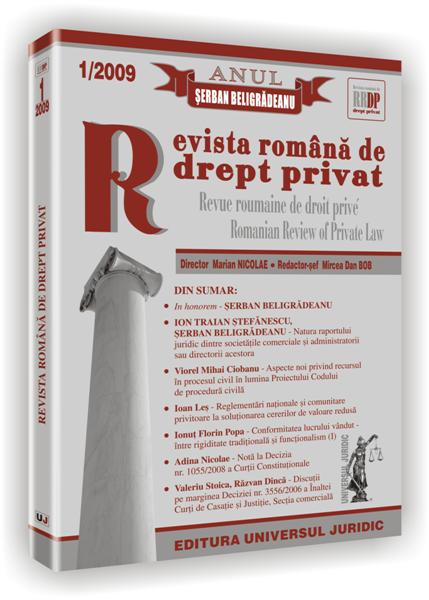Consideraţii cu privire la nulitatea recursului în materie procesual civilă
Considerations on the nullity of the recourse in civil lawsuits
Author(s): Cristina Gabriela FrenţiuSubject(s): Law, Constitution, Jurisprudence
Published by: Universul Juridic
Keywords: Civil procedure. Nullity of the recourse. The sanction of forfeiture. Tardiness.Motivation. EHRC jurisprudence
Summary/Abstract: The law on the civil procedure or the special laws can establish special deadlines for recourse. Also the initial moments when the recourse term starts to elapse can be stipulated, but every time when the norms do not contain express provisions on the deadline for recourse, this one remains the deadline applicable in common law, respectively “15 days after the issuance of the challenged award”, regulated by article 301 Civ. pr. codeEvery time we are in a matter for which there is a special regulation, derogatory from the common law with respect to the deadline for recourse, the stipulations of this special law are applied with priority. The motivation of a recourse can be performed either by the request declaring the remedy, or subsequent to this moment, but before the deadline for recourse. To motivate the recourse means to present the critics brought to the challenged award, to express dissatisfaction about the issued award, to indicate and develop the reasons of unlawfulness of the challenged award. The recourse is void if it has not been motivated within the legal period of time. The general law, of ascertainment of the recourse nullity in the hypothesis where the remedy is not motivated or where the motivation exceeds the legal deadline, comprises an exception, expressly regulated by the provisions of article 306 paragr. 2 Civ. pr. code. This text refers to the public order reasons that can be invoked by the parties, prosecutor and court, ex officio. With respect to the provisions of art. 306 paragr. 2 Civ. pr. code, we believe that the mere invocation by the person submitting the recourse of public order reasons renders inapplicable the exception of the recourse nullity for reasons of failure to motivate within the legal deadline, but taking into account the fact that the recourse has not been motivated before the legal deadline, in the hypothesis where the public order reasons invoked by the party filing the recourse are not grounded, the court shall not proceed to the analysis on the merits of the lawfulness and sustainability of the issued award, the provisions of article 306 paragr. 1 Civ. pr. code allowing only the analysis of the public order reasons, if the remedy is not motivated before the legal deadline. Therefore, every time when in front of the court judging the recourse, public order reasons are invoked, the nullity sanction cannot intervene. In such a situation, the recourse court shall proceed to the analysis, taking into account the considerations of the issued award, of the invoked public order reasons, and if it considers them as groundless, it shall reject the declared recourse, since the challenged award cannot be judged on the merits, due to the failure to motivate the remedy before the established deadline.
Journal: Revista Română de Drept Privat
- Issue Year: 2009
- Issue No: 01
- Page Range: 90-103
- Page Count: 13
- Language: Romanian
- Content File-PDF

